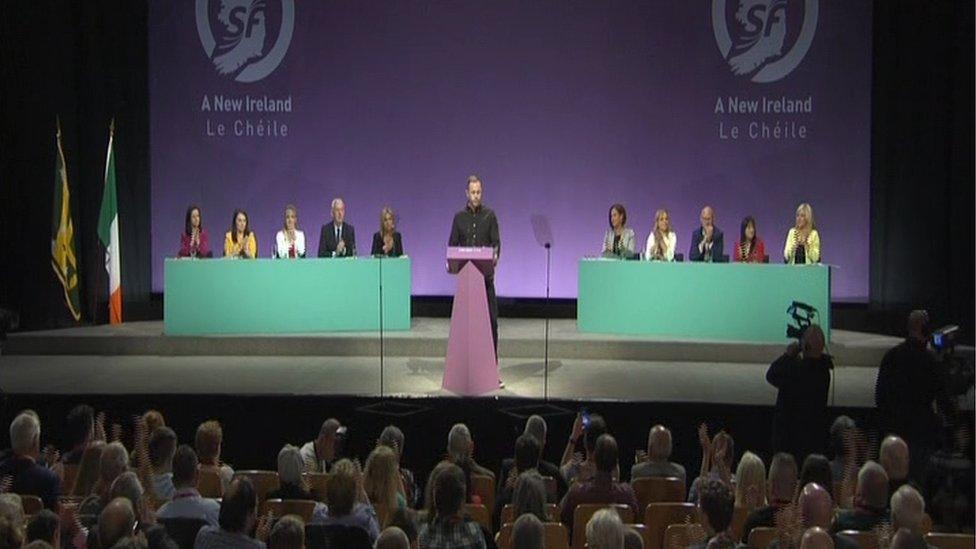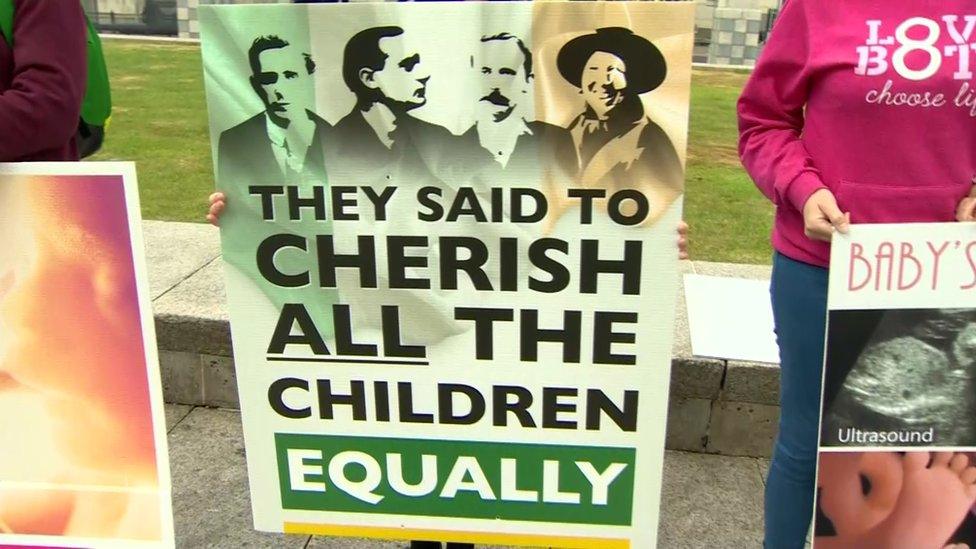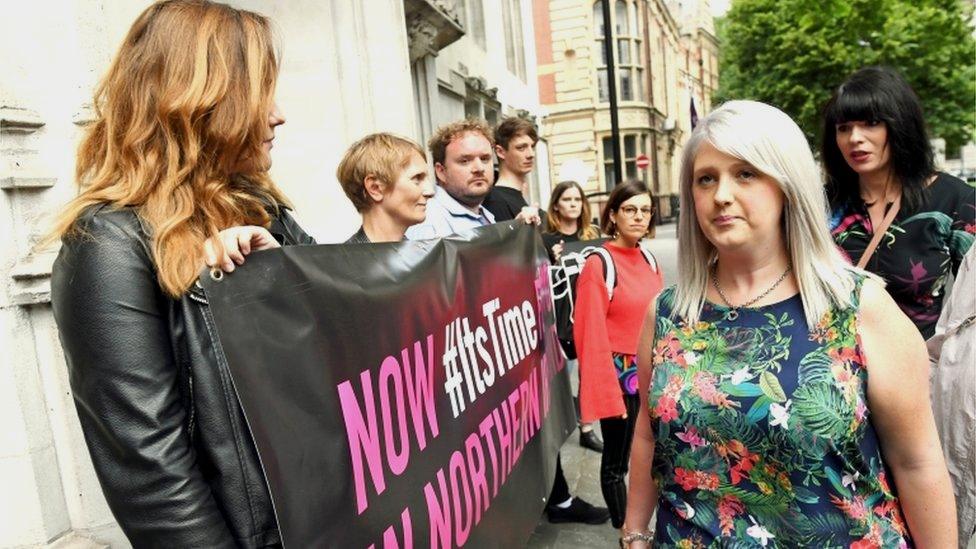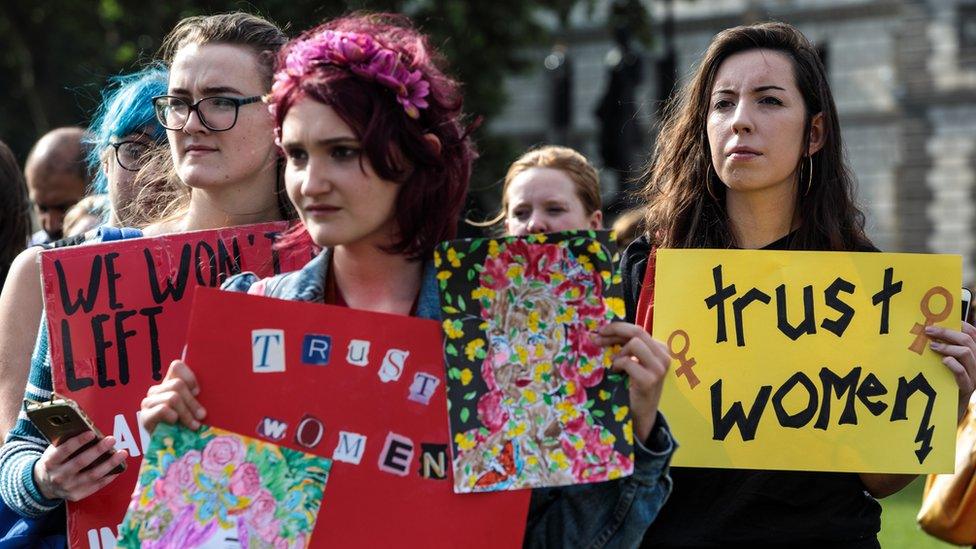Sinn Féin votes to change abortion policy
- Published

Sinn Féin delegates have voted to change the party's position on abortion at a conference in Belfast.
Members comprehensively backed a leadership motion stating that women should have access to abortions within "a limited gestational period".
The party can now support a law due to be brought before the Irish parliament, which is expected to allow abortions within the first 12 weeks of pregnancy.
More than 20 Sinn Féin branches had called for a free conscience vote.
The decision comes shortly after a referendum in the Republic of Ireland removed a constitutional amendment which effectively outlawed abortion.
Previously Sinn Féin had backed making terminations available in circumstances like fatal foetal abnormality, rape or sexual abuse.
However, the party will now back a policy put forward by the Sinn Féin leadership that is broadly in line with the new Irish law, which is expected to make abortion available to women within the first 12 weeks of their pregnancies.
Sinn Féin's Stormont leader Michelle O'Neill opened the debate and told delegates: "No-one is saying members can't have a conscience and you're entitled to have your viewpoint respected, but there is a difference between personal views and our role as legislators."
However, the few speakers supportive of a conscience vote said that by not allowing members to have a free vote, SF was effectively going to create a "cold house" for those members who take a different view on abortion.

Sinn Féin voted to change party policy at a conference in Belfast
A devolved issue
Unlike other parts of the UK, the 1967 Abortion Act does not extend to Northern Ireland, meaning that it is the only region of the UK or Ireland where abortion is illegal unless there is a serious risk to a woman's life or health.
Abortions in cases of rape, incest or fatal foetal abnormalities are not automatically legally permitted to be carried out.
Northern Ireland has been without a functioning government since the collapse of power-sharing between Sinn Féin and the DUP in January 2017.
The issue of abortion in Northern Ireland has been debated in the House of Commons, but Downing Street says it should be dealt with by Stormont once devolution is restored.
On the day of the referendum result in Dublin, Mrs O'Neill and party president Mary Lou McDonald held up a sign stating that the "north is next".
The vote in the Republic is expected to pave the way for unrestricted access to abortion during the first 12 weeks of a pregnancy.

Analysis: By Jayne McCormack, BBC News NI Political Reporter
This has been a defining conference for Sinn Féin.
The first conference without Gerry Adams at the helm, the focus was very much on the party's priorities under the new leadership of Mary Lou McDonald and Michelle O'Neill.
Both women had already openly advocated relaxing the party's policy on abortion - today their base appeared to echo that.
A long queue of people lined up to speak, and of all the delegates who took to the podium to express their views, only a handful supported giving members a conscience vote.
The decision to back the leadership on this issue is a significant one.
Out of the five main Stormont parties (bar the DUP who are staunchly opposed to abortion), Sinn Féin is now the only one that will not allow its members a conscience vote on abortion.
Ending the debate, the party's MEP Martina Anderson said there was "absolutely no space" for a conscience clause.
But will some of Sinn Féin's members feel there is no longer a space for them in the party because of today's vote?
Time will tell.

'Limited gestational period'
At the conference on Saturday, the party's leadership had backed a motion stating that women should have access to abortions within a "a limited gestational period".
The motion by the party leadership did not specify the 12-week period, but refers to making abortions available through a GP-led service "without specific indication for a limited gestational period".
Mrs O'Neill denied that this gives the Sinn Féin leadership a blank cheque to eventually back abortion in line with the 24-week period provided by the UK's 1967 Act, arguing it allowed the party flexibility in case legislation brought before the Dáil (Irish parliament) eventually reduces the time limit to 10 weeks.

Protesters at the Sinn Féin ard fheis
A former Mayor of Limavady, Anne Brolly, and her husband, Francie, who was previously elected to the Stormont Assembly, both resigned from the party over the issue.
Two Sinn Féin TDs (members of the Irish parliament), Peadar Tóibín and Carol Nolan, have been suspended in recent years for voting against party policy.
With the exception of the DUP - which opposes any change to Northern Ireland's law - the other main parties, Alliance, the SDLP and the Ulster Unionists all allow a freedom of conscience approach amongst its members.
- Published15 June 2018

- Published7 June 2018

- Published6 June 2018

- Published26 May 2018
